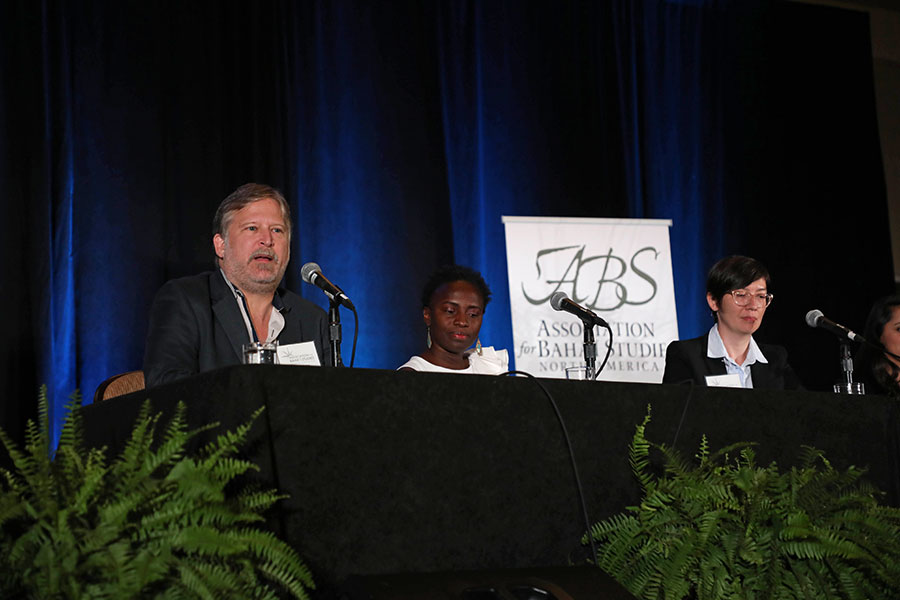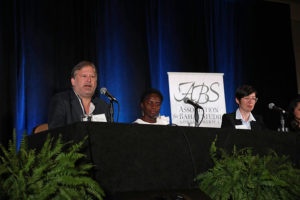



First came the inspiration, as Tara Raam discovered scholars in her field who share a commitment to promoting constructive dialogue between scientific and religious communities. Then came months of focused conversation, with friends familiar and new, to learn more deeply about the issues involved.

These were steps along the path leading to “Neuroscience, Ethics, and Religion: Moving Beyond Coexistence,” a panel discussion at the Association for Baha’i Studies–North America conference, Aug. 9–12 in Atlanta. While the content of the panel discussion helped build understanding of that topic, the process itself contributed to learning about engaging in discourse within academia and professions.
Raam, a postdoctoral fellow in neuroscience at Johns Hopkins University in Baltimore, says her aims were to build relationships with like-minded thinkers and “to ask fundamental questions together and see how we could introduce concepts from the Baha’i teachings into conversations about neuroscience, technology, human nature, consciousness, mental health and bioethics.”
It started in November 2017 when Raam and a few other Baha’is were at the Society for Neuroscience annual conference in Washington, DC. In the program they spied a session called “Interfacing with Religious Communities.” That’s a topic you don’t often see at such a gathering, so their interest was piqued.
Raam was “prepared to potentially see a debate or antagonistic conversation,” but instead “saw such humility, open-mindedness and constructive thinking.” She was inspired to share with the panelists “a bit about the Baha’i perspective on the harmony of science and religion.”
Knowing the 2018 ABS conference would be in Atlanta, Raam was excited to find that two of the scientists on the November panel are faculty members in the neuroethics program at Emory University. “It seemed like a natural opportunity to reach out and see if they’d like to join me in a conversational discussion” at ABS.
The two scientists, Gillian Hue and Karen Rommelfanger of Emory University, “responded with interest and enthusiasm,” says Raam. Hue has spent several summers teaching neuroscience coursework to Buddhist monks in exile in Tibet, while Rommelfanger spearheads the Global Neuroethics Summit, which is devoted to incorporating global and cross-cultural values into ethical questions in neuroscience.
They suggested she invite Paul Root Wolpe, who also teaches at Emory, to join them on the panel. Wolpe has written extensively on the relationship between science, technology, ethics and religious thought and all three are heavily involved in either the nascent field of neuroethics or the wider study of bioethics. Thus some essential connections were made. How, then, were topics identified for those scholars to discuss?
“I consulted with a few Baha’i friends who are very familiar with the discourse on the harmony of science and religion about what the content of this panel might be, what assumptions of the prevalent discourse in neuroscience (and neuroethics as well) we might want to examine and what kinds of questions would draw out meaningful insights,” recalls Raam.
In the weeks leading to the Atlanta conference, she and her three panelists met twice via Skype to discuss content for the presentation. “And, of course, they naturally wanted to just know more about the Faith, its teachings and how we understand science and religion to be in harmony with each other.”
As those conversations moved forward, she adds, “questions emerged, the limits of our collective understanding became apparent and it became clear what content would either need to be added into the discussion or removed entirely.”
At the same time she was consulting extensively with the ABS Executive Committee. “This was a learning process: of consultation, action and reflection, and ultimately one of reading reality and responding appropriately.”
Raam was also encouraged by the quality of questions emailed from audience members during the presentation. “As a Baha’i community, we are in a process of learning to become more and more conversant in the discourse on the harmony of science and religion,” she says, “and it was heartening to see the Baha’i community engage with such meaningful and elevated questions.”
This event, she notes, was just one part of a long-term process of learning to engage academics and professionals in conversations rooted in Baha’i principles — and in the evolution of the annual ABS conference’s role in this learning.
To keep this movement going, Raam observes, it’s essential that there are Baha’is who pay attention to who might be receptive to taking part in these conversations. It’s also important to keep on “learning how we can introduce Baha’i concepts and principles into a conversation with an attitude of humility, respect, and gratitude for the experience and insights others will share.”
The resulting variety of viewpoints “helps us learn about the nuances of a discourse and where the Revelation of Baha’u’llah can shed light on it.”


![]()
![]()
Whether you are exploring the Bahá'í Faith or looking to become an active member, there are various ways you can connect with our community.
Please ensure that all the Required Fields* are completed before submitting.